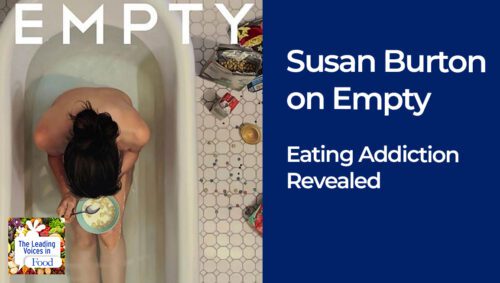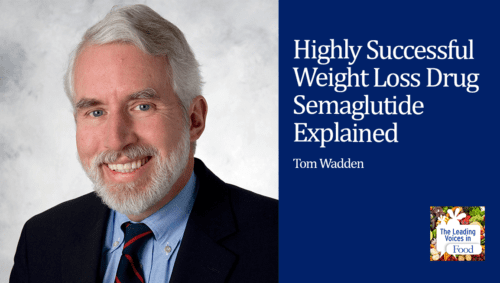The Leading Voices in Food
E166: New Efforts to Combat Diabetes and Obesity Stigma in Clinical Settings
So there’s much talk these days about weight stigma, in fact, we recorded a number of podcasts ourselves on the topic, and I believe it’s very important, but this is our first podcast on another form of stigma. One that is powerful, often overlooked, and highly important to address. Our guests today are Matthew Garza and Nick Cuttriss. Matthew is Managing Editor at The diaTribe Foundation. And the dia in diaTribe derives from diabetes. The foundation’s mission is to, and I’m quoting here, “to improve the lives of people with diabetes, prediabetes, “and obesity, and to advocate for action.” I’ve served on an advisory board for diaTribe, and very much admire their work. Nicolas Cuttriss is a pediatric endocrinologist, and is founder of the ECHO Diabetes Action Network, and also has served on an advisory committee for the diaTribe Foundation. Matthew and Nick have been integral to a novel and welcome program on diabetes stigma that launched recently, that can be seen at the website, dstigmatize.org.
Subscribe: Apple Podcasts | TuneIN | Google Podcasts | SoundCloud | PocketCasts | Radio Public
Tags: Diet & Nutrition | Eating Disorders | Obesity | Weight Stigma |

Matthew Garza is the Managing Editor of DiaTribe. Matthew Garza joined the diaTribe Foundation in 2020 after graduating with honors from Johns Hopkins University’s Whiting School of Engineering where he majored in Biomedical Engineering and minored in the Study of Women, Gender, and Sexuality. As an undergraduate Matthew was heavily involved in research, working in the Hopkins Translational Tissue Engineering Center. His research focused primarily on stem cells, three-dimensional matrix scaffolds, and surgical outcomes for transgender patients. He has a passion for understanding more about the socioeconomic determinants of health and how they affect health outcomes, primarily for the LGBTQ population. Matthew swam for the Hopkins varsity swim team and was the president of the Student Athlete Advisory Committee and Hopkins’s Athlete Ally chapter. He enjoys swimming, running, hiking, and backpacking in his free time and he will never turn down the opportunity to eat good food or listen to good music.
Dr. Nicolas Cuttriss is a social entrepreneur and a practicing pediatric endocrinologist and public health professional with a unique dedication to health disparities and improving the quality of life of people living with diabetes. He currently serves as Founding Director and CEO of the ECHO Diabetes Action Network after serving as Director of Project ECHO Diabetes and Project ECHO Diabetes in the Time of COVID-19 at Stanford University. Prior to joining Stanford, Dr. Cuttriss served as the first pediatric endocrinologist for the University of New Mexico Project ECHO Institute ENDO teleECHO clinic to democratize diabetes specialty knowledge by empowering primary care providers to care for patients with complex diabetes who lack access to routine diabetes specialty care. Clinically, Dr. Cuttriss founded and serves as Medical Director for ENDO Diabetes & Wellness, a medical practice specializing in diabetes and telehealth where he also supports and consults with medical groups and hospital systems around the country to address barriers to routine diabetes specialty care. Dr. Cuttriss also serves as co-Founder & Chairman of the Board of AYUDA (American Youth Understanding Diabetes Abroad), a 501c3 global health volunteer organization that empowers youth to serve as agents of change in diabetes communities aboard.
Interview Summary
So Matthew, let’s start with you. So can you explain what is diabetes stigma, and how does it relate to stereotypes around food and obesity?
Mathew – Absolutely. So in general, we know that stigma refers to the experiences of exclusion, rejection, prejudice, that blame and shame that people unfairly experience based on some characteristic or perceived difference. And in this case, that’s diabetes. And this might look like negative attitudes towards people with diabetes. It might be hurtful or insensitive jokes made at their expense. And in some cases, it can even be outright discrimination. While there are many forms that diabetes stigma can take, such as being singled out for wearing a visible diabetes device, like a continuous glucose monitor for example, or an insulin pump, it could also be the stigma that’s associated with having a chronic condition that does require, in some cases, daily medication. What we’re seeing is that most of the research actually shows that the bulk of the stigma associated with diabetes stems from the misunderstanding that poor choices and unhealthy behaviors are the sole cause of this condition. And that people who have been diagnosed with diabetes somehow brought it on themselves. And this is attributed to both people with type 1 and type 2. And the stigma comes from lots of different sources. So it can be external from the media in shows or on the news. It can come from your friends and your family, from coworkers, healthcare professionals in a clinical setting. And sometimes it can even happen within the diabetes community. We often see that in defending themselves from the harmful stereotypes associated with diabetes, that people with type 1 can sometimes unintentionally redirect that stigma back onto people with type 2. And in regards to how this form of stigma specifically relates to food and obesity, it really goes back to what I was saying that unless you have diabetes or unless you know someone close to you that has diabetes, a lot of time, your only real knowledge of the condition is that it’s connected to eating too much sugar, right? Or eating too much junk food, and that that somehow caused this. And a lot of times, it’s associated with obesity or having excess weight. And then, on top of that, especially in America, we have this culture that there’s this really problematic assumption that health is primarily a matter of individual responsibility. And this creates this stigmatizing narrative that blames people with diabetes for bad choices, and it sets up this us versus them. And it makes us treat people with diabetes differently because somehow they did this to themselves. But all of these beliefs oversimplify this really complex biological condition. And it overlooks all of those other, the systemic factors, such as environmental and socioeconomic context that people live in. Their access to healthy food options, to healthy grocery stores, for places to exercise. And so the more that we can kind of separate out diabetes from these misconceptions about food or sugar being its only cause, I think it’s the better that we can support people and make sure that everyone is getting the care that they deserve.
Boy, have you painted a detailed picture of that and I appreciate it, and I can imagine that navigating this world of stigmatizing events must be especially difficult for children. But let me ask you, overall, what are the negative impacts of diabetes stigma?
Mathew – Absolutely, so there’s so much research that I think still needs to be done to get a picture of the prevalence, the impacts, and the interventions that can address diabetes stigma. And thankfully, we’ve had some really great leaders in the field who have started to lay the groundwork to show all of this. And we see that diabetes stigma, and especially the language that we use to talk about diabetes has extremely negative effects. People with diabetes report feelings of fear, embarrassment, blame, anxiety, low self-esteem as a result of experiencing stigma. And this can translate into really harmful mental health conditions such as depression or higher levels of stress that drive unhealthy behaviors and can increase a person’s risk for developing even greater health complications. You know, I know that Rebecca Puhl has touched on this a lot in her research on weight bias that we have this idea that potentially having this stigmatizing attitude will somehow motivate people. And in this case, motivate people with obesity or excess weight to improve their current habits. But actually, it has the opposite effect, and it causes things like harmful disordered eating or leading people to avoid physical activity altogether. And in the same vein, we see it happening with diabetes as well, that the stigma associated with the condition actually leads to worse self-care and worse diabetes management. So for example, we’ve talked to people, and seen in the research that they report injecting insulin only in public restrooms or at home, that they might choose to make an unhealthy food choice to avoid declining what is being offered to them. And even manipulating their glucose logs or lying about the management that they’re doing just to avoid criticism from significant others or from healthcare professionals. And specifically, when the stigma is from healthcare professionals, it can actually inhibit people from seeking the necessary care that they need. One of the really concerning things that we’ve seen recently is that the research shows that people with diabetes fear being exposed for having diabetes or being labeled as disabled. And it discourages them from being open about their diagnosis in a way that is also influencing those who might be at risk, because it’s acting as a barrier overall to awareness about the condition and to prevention. And it’s increasing those feelings of isolation right after a diagnosis. And so the sheer breadth of all of these negative effects is why we believe that addressing diabetes stigma is such an essential missing element of effective diabetes care.
Well, in a very short time, you’ve mentioned a number of very troubling consequences, and you can see how these things would feed on each other and you’d have this cascade of negative effects that could really impact just about every part of a person’s life. So Nick, let’s turn to you. So research on both diabetes and weight stigma has shown that people often report feeling stigmatized in healthcare settings. So what experiences are common in these settings, and how can healthcare professionals advise people on the relevant issues like lifestyle change without making stigma worse?
Nick – So Matthew touched on it earlier in terms of stigma around when people are diagnosed with diabetes, they are blamed and shamed “that it’s your fault.” But then, it’s also perpetuated after diagnosis, and healthcare professionals putting blame and shame on patients for, quote, “being uncontrolled.” And there’s a marker, the A1C, which many healthcare professionals use. And we report EDIS rates in terms of quality improvement. And A1C less than 9% is how the health system separates out between people who are, quote, “controlled or uncontrolled.” And the majority of people living with type 1 diabetes and type 2 diabetes have A1Cs that are greater than 7%, and they’re not able to meet the targets. And so we, as healthcare professionals, need to become more explicit in working to overcome these implicit biases we label our patients as uncontrolled and perpetuating this stigma. A couple examples of what we can do in the healthcare professional setting is focusing on our language. And diaTribe has a great resource on their website, or you can look at the dstigmatize.org website to watch a couple video clips and really understand how language matters. So not labeling someone as diabetic, but they’re a person living with diabetes before diabetic. They don’t have good or bad blood sugar control. Their numbers are high, their numbers are low. Using descriptives, not saying, “Let’s test someone’s blood sugar,” but checking someone’s blood sugar. They’re not on trial for their diabetes. And I think us as healthcare professionals need to realize when the majority of people living with diabetes aren’t able to meet targets, it’s not their fault. It’s our fault. It’s the delivery of healthcare that’s failing, and it’s not the patients who are failing. And we need to be more empathetic to them. And then, when it relates to obesity, similarly, when almost 50% of adults in the US are obese, and more than half are obese and overweight, we need to stop labeling them as obese and their fault when it’s the majority of people who have this. I just had a colleague in the healthcare professional arena come to me last week, he said, “Nick, you know what? They put obesity on my diagnosis, I’m so upset.” And this is someone who is trying to address their weight and get newer medications that help address the weight. But the healthcare professionals said, “No, you need to try more.” So I think we need to change our approach of how we label our patients, and how we approach them with this blame and shame.
Well, and it’s easy to see how people who feel stigmatized and have difficulty in the medical settings with the healthcare professionals they’re interacting with would be more likely to avoid care, and that could exacerbate their condition. So let me ask this, do you see any signs that this issue is being addressed in the medical profession? Does it come up in med school training? Is it part of continuing education? Is it on the radar anywhere?
Nick – I wish it was more systematically. I think maybe at some institutions where there are champions for people living with diabetes, where a student might get a lecture, but unfortunately, I don’t see it there. And I think that’s what’s so exciting about diaTribe dStigmatize initiative is really to get more broader reach and get the basics. So in medical school, we get into all these details in terms of cause of diabetes and medications. But I think if we could just back up on the humanistic level and know how to talk to people with chronic conditions, we’ll train the next generation of leaders much more humanistically and have better outcomes if we can focus on the basics of how to interact with people living with chronic conditions, and getting rid of this blame.
It sure would be nice to see some of those things happen. So I’d like to ask a question of both of you. So it’s clear that addressing diabetes stigma is a complex challenge. So what does diaTribe think needs to happen to begin combating this problem? And, Matthew, let’s start with you.
Mathew – Thank you both so much for mentioning dStigmatize; that’s what we’re really excited about. We just launched this online resource that we hope is going to be the first step, because when we started to look at what is the landscape of resources out there for someone who wants to make sure that they are able to understand what the problem is and how to address it, there really was no centralized location. So what we wanted to do is bring resources together to make it a one-stop shop that anyone who wanted to learn about how to identify this form of stigma, why it might be harmful, or hear the real life stories from people with diabetes, about their condition, and about how stigma has affected them, that they would be able to do that in this one place. And we launched this resource primarily because we think that there’s two very essential first steps that we need to take. And the first is that in order to address this public issue, we have to shift away from that really pervasive blame and shame mindset, right? So we want to reframe the way that people are thinking about diabetes, so that it’s viewed as this complex, but manageable condition that nobody asks for. And not that it’s somehow a failure of personal responsibility. So part of that has been that we’ve been really grateful that so many members of the diabetes community have been so open to sharing their stories because it’s really helping us paint a picture of what diabetes actually looks like, and the ways that stigma affects people on a day-to-day basis. And then, the second part that our website really addresses is that language. And so leaders like Jane Dickinson, Susan Guzman, and Jane Speight have all been really key in making sure that language is seen as one of those tenets when it comes to addressing diabetes stigma, that the words that we’re using to talk about diabetes currently lack that kind of awareness, and consideration, and even empathy at times. But because language matters and it has real impacts on the way that people with diabetes view themselves, how healthcare providers view people with diabetes, and how the general public views them, we wanted to create very specific language guidance directed at people who might write, or talk, or communicate about diabetes in some way, that encourages them to use words and phrases that are neutral, that are nonjudgmental. And at its very core, that are based on the facts, and actions, and physiology or biology that can actually help people, right? We want to get away from using all those terms that Nick was talking about like bad glucose levels or controlling their diabetes, because those just aren’t actually factual when it comes down to it. Looking forward, dStigmatize is just the first step. We think that there’s so many other initiatives aimed at getting more research funding to really explore this issue and its impacts. We think that there’s the potential for media advocacy campaigns, similar to what GLAD did at the beginning of the LGBTQ Civil Rights Movements in addressing the negative representation of people who are LGBTQ in the media that a similar thing could be done because there’s so many negative portrayals of diabetes and inaccurate portrayals in the media. And then, finally, the campaigns that influence the general public’s attitudes towards diabetes. One of the key next steps might be influencing healthcare providers’ interactions because like both of you said, we know that the research shows that this is a key area where people are experiencing stigma. And this is also a group that I think truly wants to make sure that their patients are feeling empathy, and that they’re able to help them in any way that we can. And so I know that this actually is a very specific intervention that Nick has been doing a lot of work around and can speak to the importance of.
It’s a very comprehensive effort you’re discussing. So Nick, what would you like to add to that?
Nick – Yes, so, I’m a hyperspecialist in pediatric endocrinology, and there’s just not enough adult endocrinologists or pediatric endocrinologists to care for people living with diabetes. And we just need to recognize that frontline healthcare professionals have more of an opportunity, more touch points to make a difference than a specialist like me. And we really must do everything to support frontline healthcare professionals in overcoming diabetes stigma. So as founding director of the ECHO Diabetes Action Network formed to combat system failures in our society in how we educate clinician and approaches to medical management for people with diabetes. And we’re seeking to democratize diabetes specialty knowledge, so they can reach frontline healthcare professionals and power underserved populations living with diabetes. So an example of the efforts to target frontline healthcare professionals and improve care, we’ve launched a monthly educational series focusing on diabetes and disparities in the primary care setting. And then, the initial focus was attention to CKD and diabetes, and we’re going to be moving focus areas moving forward. And we’ll do a block on cardiometabolic issues, and obesity-related diabetes disparities. And then, also, we’ll collaborate with diaTribe on launching one for addressing diabetes stigma and behavioral health, just to name a few. So for more information, feel free to visit echodiabetes.org, and join us for being a champion for people living with diabetes in the primary care setting.











